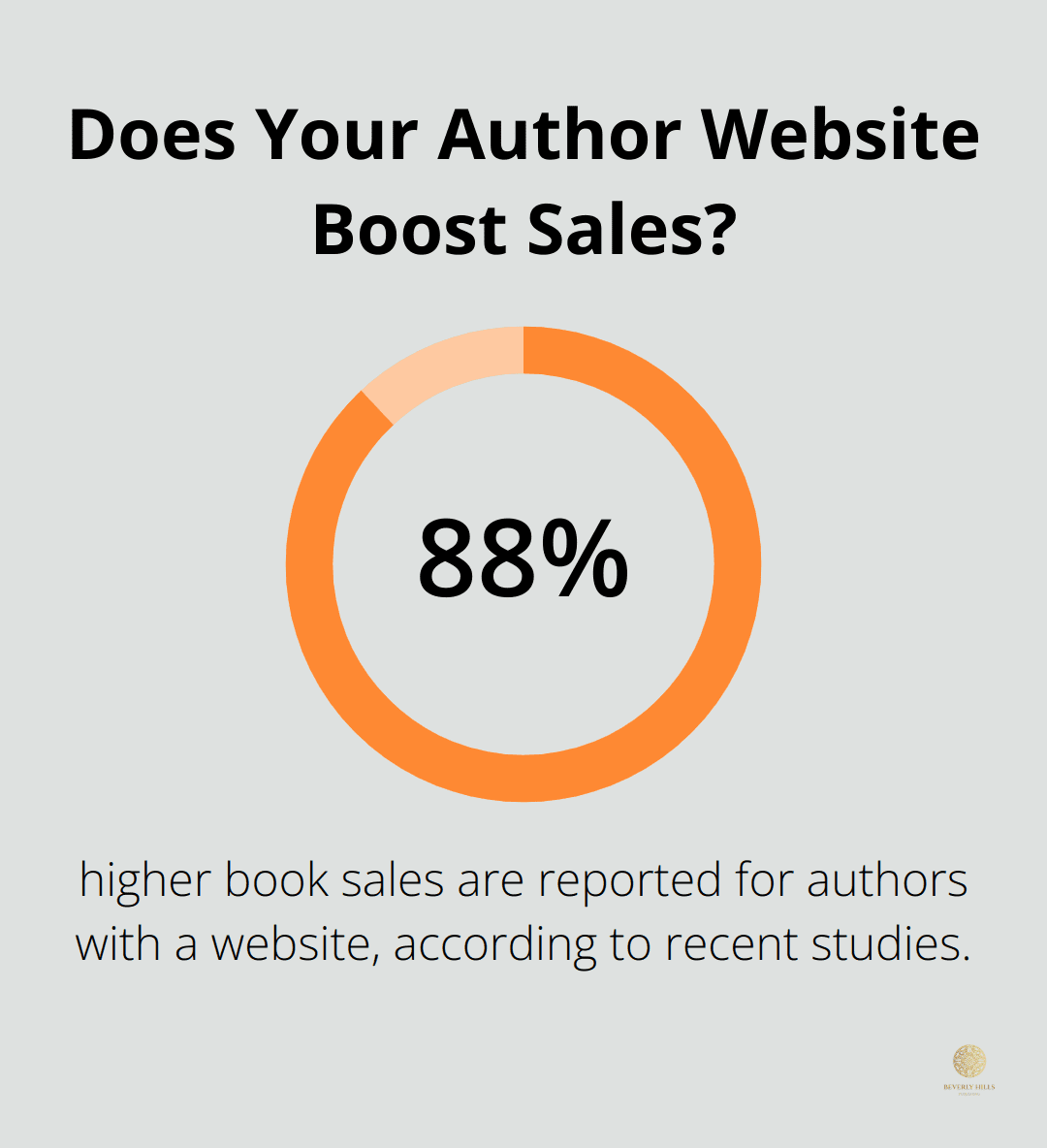Self-publishing has revolutionized the book industry, but marketing your work effectively remains a challenge. At Beverly Hills Publishing, we understand the hurdles authors face when promoting their books.
This guide will equip you with practical strategies for self-publishing book marketing, helping you reach more readers and boost your sales. From building your author platform to leveraging collaborative opportunities, we’ll explore proven techniques to make your book stand out in a crowded marketplace.
Building Your Author Brand
Creating a strong author brand is essential for self-published authors. A well-crafted brand can elevate an author’s visibility and credibility. Here’s how to build your author platform effectively:
Craft Your Author Website
Your website serves as your digital home base. Make it professional and user-friendly. Include an about page, book information, blog, and contact details. Use high-quality images and ensure your site is mobile-responsive. Recent studies show that an author website leads to 88% higher book sales, highlighting its importance for self-published authors.
Harness Social Media Power
Select 1-2 platforms where your target readers congregate. Fiction authors often find Instagram and TikTok effective. Non-fiction writers might prefer LinkedIn or Twitter. Post consistently and engage with your audience. Quality trumps quantity. Hootsuite reports that businesses posting 1-2 times per day on social media see a 73% higher conversion rate than those posting more frequently.
Launch an Email Newsletter
Email marketing remains one of the most effective ways to reach readers directly. Start collecting email addresses on your website by offering a free chapter or short story. Use email service providers (like MailChimp or ConvertKit) to manage your list. While Amazon remains the biggest player in indie publishing, other platforms also contribute significantly to indie authors’ revenue, particularly for those who choose to publish across multiple platforms.
Develop a Consistent Brand Voice
Your brand voice should reflect your personality and resonate with your target audience. This voice should remain consistent across all platforms (your website, social media, and email communications). Try to develop a unique style that sets you apart from other authors in your genre.
Create Valuable Content
Focus on creating content that adds value for your audience. This could include writing tips, behind-the-scenes glimpses of your writing process, or updates on your latest work. Valuable content helps build trust and loyalty among your readers.

As you build your author brand, you’ll create a solid foundation for marketing your self-published book. The next step is to leverage specific book marketing strategies to reach more readers and boost your sales.
Effective Book Marketing Tactics
After you establish your author brand, focus on specific marketing strategies for your self-published book. These tactics will help you increase visibility, attract readers, and boost sales.
Optimize Your Book’s Metadata
Your book’s metadata is essential for discoverability. This includes your title, subtitle, book description, and keywords. Research popular keywords in your genre using tools like Publisher Rocket or KDSpy. Incorporate these naturally into your book description and metadata. A study by Written Word Media found that authors who regularly update their keywords see a 35% increase in book sales.
Leverage Amazon’s Marketing Tools
Amazon offers several promotional tools for self-published authors. Amazon Advertising allows you to create targeted ads for your book. With 77% of book buyers discovering new titles or authors on Amazon, ads are an effective way to get noticed. Start with a small daily budget ($5-$10) and monitor your results closely. Many authors report a return on investment of 2-3 times their ad spend. Additionally, use Amazon’s free promotional days if you’re enrolled in KDP Select. These can help boost your book’s ranking and visibility.
Gather Authentic Reviews
Reviews build credibility and encourage sales. Reach out to book bloggers, BookTubers, and BookTokkers in your genre. Offer them a free copy of your book in exchange for an honest review. Use services like BookSiren, BookSprout, or Hidden Gems to connect with potential reviewers. Try to get at least 20-30 reviews before you invest heavily in paid advertising.
Participate in Virtual Events
Online book events and virtual tours offer a cost-effective way to reach readers globally. Look for virtual book fairs, author panels, or reading series in your genre. Websites like The Virtual Book Channel list upcoming events. When you participate, prepare engaging talking points about your book and be ready to interact with attendees in the chat.
Collaborate with Other Authors
Cross-promotion with other authors in your genre can expand your reach. Organize joint giveaways, podcast appearances, or social media takeovers. A survey by the Alliance of Independent Authors found that 68% of successful indie authors regularly collaborate with peers for marketing purposes.

Effective book marketing requires continuous effort and adaptation. As you implement these strategies, you’ll discover which tactics work best for your book and audience. The next section will explore how to leverage industry connections to further amplify your marketing efforts.
Networking for Success
Join Writing Communities
Writing groups and associations offer support and opportunities. The Authors Guild provides immediate access to services that span the entire professional life of a writer, from contract reviews and legal assistance. Local writing groups, often found through libraries or bookstores, offer critique sessions and moral support. Online communities like Scribophile provide feedback and potential beta readers.
Attend Literary Events
Literary conferences and workshops are excellent for networking. The annual Writer’s Digest Conference offers pitch sessions with agents. Smaller, genre-specific events like ThrillerFest or Romance Writers of America’s annual conference can lead to more targeted connections. These events often result in collaborations.
Partner with Complementary Businesses
Think beyond the book world. If you’ve written a cookbook, team up with local kitchenware stores for book signings. For business books, collaborate with co-working spaces or chambers of commerce. The Independent Book Publishers Association has an Industry Advisory Committee tasked with investigating and shaping the future of independent publishing.
Form Author Alliances
Create alliances with authors in your genre. Box sets, where multiple authors bundle their ebooks, have become increasingly popular. Consider organizing joint book tours or online events.
Connect with Book Bloggers and Influencers
Book bloggers and social media influencers can significantly boost your visibility. Reach out to bloggers in your genre and offer exclusive content or interviews. Focus on building relationships, not just promoting your book.

Networking expands your reach as an author far beyond what you could achieve alone. It creates a supportive community and opens doors for future opportunities.
Final Thoughts
Marketing a self-published book successfully requires a multi-faceted approach. Authors must build a strong platform, leverage specific tactics, and network within the industry. Consistency in marketing efforts pays off – many successful authors report their breakthrough came after months of steady effort. The world of self-publishing book marketing evolves rapidly, especially in the digital age.

Authors should stay informed about new trends and technologies. They must experiment with different approaches and analyze their results. What works for one author may not work for another, so adaptation of strategies based on unique audience and genre is essential. Self-publishing is an ongoing process that demands continuous refinement of skills in both writing and marketing.
At Beverly Hills Publishing, we understand the challenges and opportunities in self-publishing. Our approach combines publishing with strategic branding and marketing (helping authors establish themselves as leading authorities). We equip authors with tools and strategies to elevate their visibility and build strong brand identities.















































































































































































































































